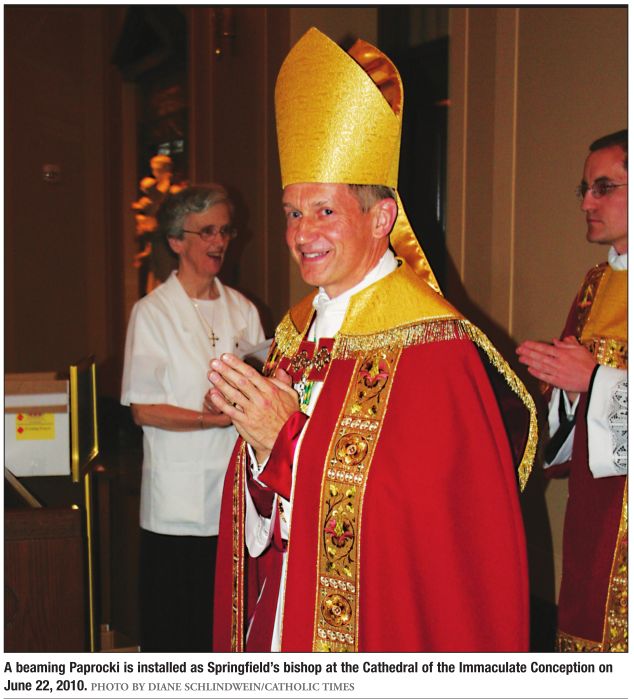
“I’ve heard that for years – that was the impression I always had,” the bishop says. “Nineteen seventy-two, I was still in college. If I’m in error, I stand corrected.”
That Paprocki would flub such a simple fact surprises Ed Grossman of Chicago, who met the bishop more than three decades ago on the opening day of classes at DePaul Law School.
“He’s pretty detail-oriented,” says Grossman, who remains a close friend.
Paprocki as a law student held his ground in the same way he does today, Grossman recalls.
“He wasn’t a back-of-the-class guy,” Grossman says. “He would, occasionally, get into a discussion or debate or argument with a professor on principles of constitutional law or principles of law.”
Paprocki is as conservative as they come when it comes to church doctrine, Grossman says, but on social issues such as environmental justice, he is “extremely liberal.”
After passing the bar exam in 1981, Paprocki and Grossman founded the Chicago Legal Clinic, which still provides legal services to the poor. Grossman is executive director while Paprocki remains president. Grossman, who is Jewish, says the bishop has a keen sense of humor, the sort who enjoys stories that begin with “A priest and a rabbi walk into a bar….”
“He always tells those jokes,” Grossman says. But Paprocki knows where the line is located. “He is never not a bishop,” Grossman says.
“It’s not a job for him. It’s a lifestyle. It’s something that permeates every aspect of his being.”
Paprocki entered law school three months after he was ordained – it was all part of a plan that made sense to him, he says, but perhaps not to others.
“That all fit for me,” he says with a chuckle. “I describe the law as a tool for ministry.
Other people looking at that, ‘He was ordained a priest and now he’s studying to be a lawyer? He’s already so dissatisfied with the priesthood...’” Paprocki remains a lawyer with malpractice insurance. He says he does pro bono work, but won’t elaborate. While Grossman foresees him becoming a cardinal, Paprocki says he didn’t see himself becoming a bishop when he graduated from law school and became an associate pastor in a Chicago parish.
“I knew that my priesthood was going to be, in some ways, a little bit different because of my interest in the law,” the bishop says. “I was going to be a parish priest with a kind of specialized project.”
That vision didn’t last. He lasted just five years as a parish priest in a south Chicago church before he was named a parish administrator. In 1985, four years out of law school, he became a vice-chancellor for the Archdiocese of Chicago and rose to chancellor in 1992. After a two-year stint as pastor of St. Constance Parish in Chicago, Pope John Paul II made him auxiliary bishop of the Chicago Archdiocese in 2003, a position he kept until coming to Springfield. Along the way, he learned to speak Italian while studying canon law in Rome. He already spoke Polish and Spanish, byproducts of studying Spanish at Loyola University, where he earned a bachelor’s degree, and being raised in a Polish neighborhood that became popular with Hispanics.
continued on page 14